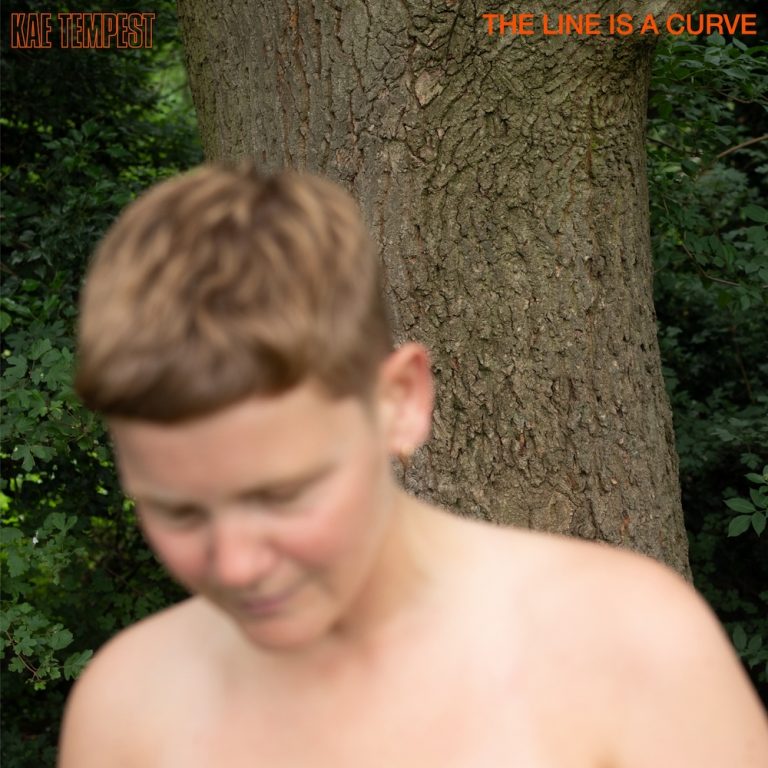Narrative has always been at the heart of Kae Tempest’s work. The south-east London poet and rapper has written concept albums, plays, a novel, and several epic poems since first taking to the stage at the age of 16. With extreme empathy, Tempest is capable of turning the stories of ordinary people into lyrical portraits of fissured Britain, a skill that has seen them recognised as one of the country’s foremost poets. Over experimental hip-hop beats and gentle piano chords alike, these tales have resulted in two Mercury Prize nominations and a slew of literary accomplishments. Their latest work, The Line Is A Curve, however, eschews the rich cornerstone of narrative in favour of a more abstract, personal approach – initially, at least.
It’s too easy to say that Tempest coming out as non-binary in 2020 was the catalyst for this new direction. Work on The Line Is A Curve began long before, whilst the poet was still touring 2016’s Let Them Eat Chaos. Yet themes of identity and acceptance are present here, even if explicit references to trans issues are few.
The influence of Rick Rubin, executive producer on previous album The Book of Traps and Lessons, can be felt too, particularly in the live vocals; recorded in one take to an audience of one (Tempest’s friend and fellow poet Bridget Minamore). The result moves Tempest away from the prophetic delivery of their earlier work, creating a more intimate record that shakes off the hip-hop preacher aesthetic. While Dan Carey’s production work is varied, struggling with coherency in the absence of an overarching narrative, he and Tempest are able to create individual songs that meld lyrics and music effortlessly.
Previous albums have featured standout tracks in “People’s Faces” and “Tunnel Vision”; songs with an epiphanic quality that both confront and comfort the listener, forcing one to stop, focus, and listen. There are no such songs on The Line Is A Curve, though there are moments that come close. The sentimental piano chords of “No Prizes” coupled with Tempest’s character-led observations make for a beguiling listen, and that’s before Lianne La Havas’ guest vocals arrive, elevating the track to new heights.
It’s an entry that cuts through what is, until that point, a synth-heavy affair. Beyond this watershed moment lies a string of exquisitely orchestrated tracks, including the jazz-edged “Don’t You Ever” and the wonderfully observed “These Are the Days”. Live instrumentation emboldens Tempest’s voice; it glides across skittish drum beats with tenacity and warmth, grabbing the listener by the hand and refusing to let go.
“Water In The Rain”, with ãssia, is the stirring culmination of this run. The elegance of Tempest’s imagery is enhanced by a cinematic soundscape of arpeggios and rousing strings. Grandiose statements and quotidian details cavort amid glittering synths, sometimes within the same verse. “I’m in your arms in the front room… And I’m in pieces,” states Tempest. There is a depth to the simplicity here, demonstrating measured restraint on the part of the poet.
The album suffers when this deep imagery is replaced by quick sketches in the form of lists. “Nothing To Prove” is especially reliant on this literary device, numbing the listener to later high points like ‘Salt Coast’. “Click-bait. Mistake. Makeshift. Piss-take. Forcefield. Boredom. Risqué. Mistress” and other such lines appear all too often, blunting them in the context of the album.
There’s a similar problem with the guest appearance of Brockhampton’s Kevin Abstract and, to a lesser extent, Grian Chatten of Fontaines D.C.. Where the bars of south London rapper Confucius MC fit seamlessly alongside Tempest’s on “Smoking”, Abstract’s feel incongruous among erstwhile references to “Rule Britannia” and “White Ace” cider. Perhaps it is the American accent on what feels to be a very British record. Independently of the album, however, and “More Pressure” becomes the perfect single choice, happy to play with language and drive forward on a thumping beat.
On The Line Is A Curve, Tempest steps down from the pedestal, takes the listener aside from the crowd and addresses them solely, sometimes in the guise of a lover, more often as a friend, always as a poet. Its fragmented nature is tied to its accessibility; each track stands alone on its own merits, albeit at the expense of the record as a whole. The more oblique lyricism allows for the possibility of wider interpretations here, where previously they have felt out of reach. In relinquishing the role of preacher, Tempest has opened up an introspective path, lined with implicit narratives – it is for the listener to draw them out.

